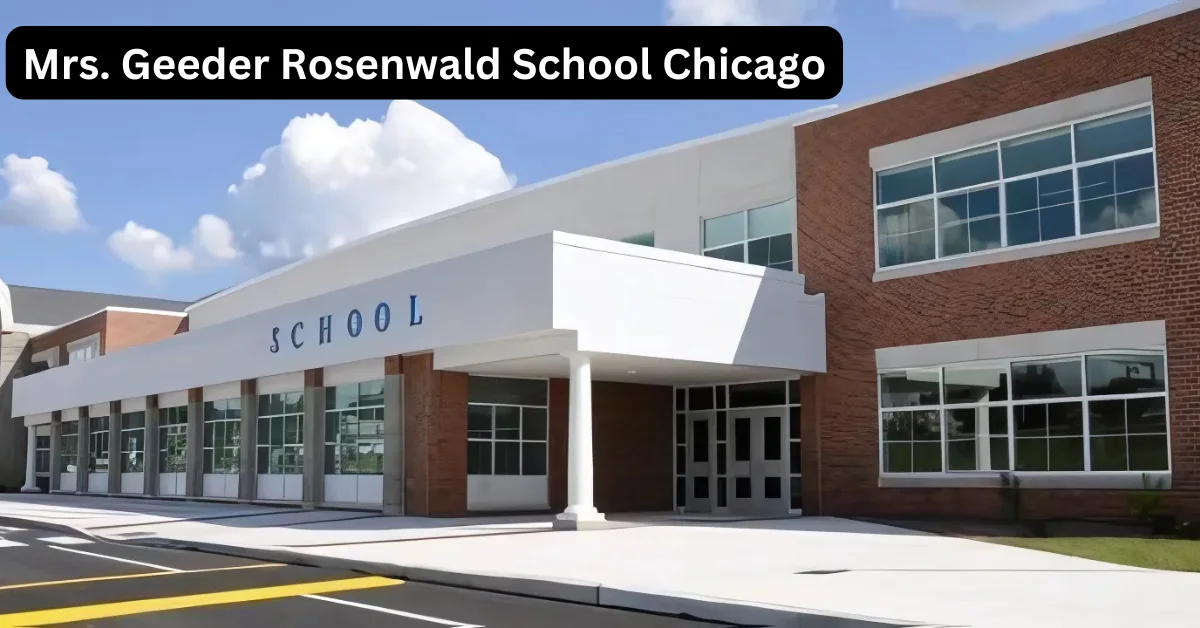The Mrs. Geeder Rosenwald School stands as a testament to the resilience and dedication of African American communities in the early 20th century. Established during a time when educational opportunities for Black children were severely limited, this school played a vital role in shaping the lives of countless students. It is not just an educational institution; it represents a rich legacy of empowerment, cultural pride, and community spirit.
Who Was Mrs. Geeder?
However, in most written history, she remains more obscure yet, Mrs. Geeder was active in changing many lives through the Rosenwald Schools. These were school created by the philanthropy romantics of Julius Rosenwald and educationist Booker T. Washington for the black kids in the southern still racially divided states of America. Her position in the leadership of the movement in the Chicago section of the country was an extension of that. She was trying to transplant the idea of this education system into the cities.
The Mission Of The Rosenwald Schools
The main goal of the Rosenwald Schools was to tackle the educational inequalities faced by African American students in the segregated South. These schools were established to ensure that Black children had access to quality education at a time when funding for their schools was severely lacking. Mrs. Geeder Rosenwald School was a shining example of this mission, providing a supportive environment where students could thrive despite the challenges they faced. The school became a source of hope for many families, offering not only academic instruction but also a sense of community and belonging.
Unique Teaching Methods and Curriculum at the School

Mrs. Geeder Rosenwald School is proud of its modern coaching methods, which are designed to interact actively with college students. The curriculum blends traditional topics with hands-on learning of studies that foster creativity and critical thinking. Teachers use task-based learning, permitting students to address real-world problems. This approach deepens knowledge and promotes teamwork and communication abilities crucial for future success. In addition, the school emphasizes cultural education. Students explore their history through artwork, song, and storytelling, instilling delight in their identity while broadening their perspectives. Technology is also integrated into instructions. Classrooms have digital equipment that enhances interaction and makes mastering extra dynamic.
Impact on the Local Community
The Mrs. Geeder Rosenwald School wasn’t just about reading, writing, and arithmetic—it was about changing lives. It played a vital role in improving literacy rates in the community, giving children access to an education that their parents and grandparents may have only dreamed of. At a time when educational opportunities for African Americans were scarce and underfunded, schools like Mrs. Geeder’s were lifelines for families who wanted their children to have better opportunities.
Building Strong Community Ties
The Mrs. Geeder Rosenwald School served as more than an educational institution; it was a gathering place for the community. Events such as cultural celebrations, workshops, and parent-teacher meetings created a strong sense of belonging among families. Mrs. Geeder encouraged parents to be actively involved in their children’s education, fostering open communication and collaboration.
Read Previous: Arleata williams
Challenges Encountered By Mrs. Geeder Rosenwald School
Despite its promise, Mrs. Geeder Rosenwald School faced numerous challenges.
Resource Limitations
Funding shortages plagued many Rosenwald Schools, as predominantly white school boards often allocated minimal resources to Black institutions. Mrs. Geeder’s school frequently grappled with outdated materials, inadequate supplies, and overcrowded classrooms. Nevertheless, her determination and creativity enabled the school to thrive under these challenging circumstances.
Segregation and Discrimination
During the era of Mrs. Geeder Rosenwald School, strict segregation laws were in place across the South. African American students were systematically denied access to well-funded white schools and faced discrimination in many aspects of life. Mrs. Geeder fought diligently against these injustices, advocating for equitable treatment and enhanced opportunities for her students.
Preservation Efforts and Current State of the School
In recent years, preservation efforts for the Mrs. Geeder Rosenwald School have gained traction. Residents, historians, and preservationists all appreciate its historical value and are committed to ensuring that this monument remains relevant in the future. Maintenance initiatives aim to conserve the school building’s initial design while enhancing it to fit contemporary requirements. Volunteers are usually organized during clean-up days and participate in beautifying barren spaces. Several local individuals and organizations have received grants and GSU to accurately restore the building’s internal and external features.
Why Mrs. Geeder Rosenwald School Matters Today
The Mrs. Geeder Rosenwald School may have served its last class long ago, but its legacy is more relevant than ever. In a time when conversations about educational equity and historical preservation are front and center, the story of Mrs. Geeder’s school offers valuable lessons. It reminds us that community-led initiatives can create lasting change, even in the face of systemic obstacles.
The Legacy of Mrs. Geeder and the School
The impact of the Mrs. Geeder Rosenwald School can be seen in the achievements of its alumni. Many former students have gone on to become leaders in their respective fields, attributing their success to the solid educational foundation they received at the school. The values instilled by Mrs. Geeder—resilience, commitment, and community engagement—have resonated throughout their lives.
FAQs
What is the Mrs. Geeder Rosenwald School?
A: The Mrs. Geeder Rosenwald School may refer to a historic or community-focused educational institution inspired by Julius Rosenwald’s philanthropic school-building efforts for African American communities. However, specific references to “Mrs. Geeder” are unclear and may require further historical research.
What are Rosenwald Schools?
A: Rosenwald Schools were a network of schools built in the early 20th century, primarily in the rural southern United States, to provide educational opportunities for African American students. They were funded in part by Julius Rosenwald, a philanthropist and president of Sears, Roebuck & Company.
Was there a Rosenwald School in Chicago?
A: While Rosenwald Schools were primarily established in the South, Julius Rosenwald lived in Chicago and supported numerous philanthropic and educational initiatives there. Schools in Chicago might reflect his influence, though the term “Rosenwald School” was less common in urban areas.
Who was Mrs. Geeder, and what is her connection to Rosenwald Schools?
A: The name “Mrs. Geeder” does not appear in widely known historical records related to Rosenwald Schools. It might be a localized reference to a specific person or institution in Chicago. Additional details would help clarify this connection.
How can I learn more about Rosenwald Schools?
A: Resources like the National Trust for Historic Preservation, local historical societies, and archives on African American education can provide insights. For Chicago-specific connections, researching Julius Rosenwald’s philanthropic efforts in the city is a good starting point.
Conclusion
The connection between “Mrs. Geeder” and the Rosenwald Schools in Chicago is not immediately clear, but it reflects a potential intersection of historical educational efforts and local narratives. The Rosenwald Schools remain a significant legacy of Julius Rosenwald’s vision to improve education for underserved communities, primarily African Americans in the rural South.
Stay Updated With: Internetchicks!
